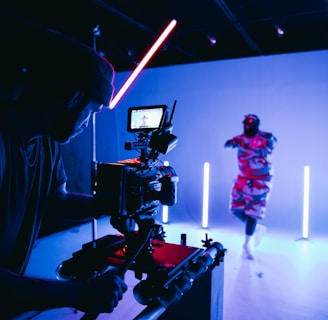Scripting the Unseen: Ghostwriting for Documentaries
Bibliotheca Exotica
2 min read


Introduction
Documentaries have the power to captivate audiences and shed light on important topics. While the focus is often on the visuals and storytelling, the script behind a documentary plays a crucial role in shaping the narrative. In some cases, the script may be written by a ghostwriter, someone who remains unseen but contributes significantly to the success of the documentary. In this blog post, we will delve into the world of ghostwriting for documentaries, exploring the research involved, how to present factual information engagingly, and the ethical considerations of documentary writing.
The Research Process
When it comes to ghostwriting for documentaries, thorough research is key. A ghostwriter must dive deep into the subject matter to understand the nuances, gather factual information, and identify compelling stories to include in the script. This involves consulting various sources such as books, articles, interviews, and expert opinions.
Additionally, the ghostwriter needs to collaborate closely with the director or producer to ensure that the script aligns with their vision for the documentary. This may involve attending meetings, conducting interviews, and participating in brainstorming sessions to shape the narrative effectively.
By immersing themselves in the research process, ghostwriters can bring a fresh perspective and valuable insights to the documentary script, enhancing its overall quality and impact.
Presenting Factual Information Engagingly
While documentaries aim to present factual information, it is essential to engage the audience and keep them invested throughout the film. This is where the skills of a ghostwriter come into play. They must find creative ways to present information, ensuring that it is both informative and entertaining.
One technique often employed by ghostwriters is storytelling. By weaving real-life stories and personal anecdotes into the script, they can make the documentary more relatable and emotionally engaging. This helps to create a connection between the audience and the subject matter, leaving a lasting impact.
Furthermore, the use of visual aids such as graphics, animations, and archival footage can enhance the storytelling process. Ghostwriters work closely with the production team to suggest visual elements that complement the script, making the documentary visually appealing and informative.
Ethical Considerations in Documentary Writing
Ghostwriting for documentaries raises ethical considerations that must be addressed. As a ghostwriter, it is crucial to maintain transparency and integrity throughout the process. This means properly crediting the primary sources of information and giving credit where it is due.
Additionally, ghostwriters must ensure that the information presented in the documentary is accurate and unbiased. While documentaries often have a specific perspective or message, it is important to avoid misrepresenting facts or manipulating information to fit a particular narrative. The audience relies on documentaries to provide them with truthful and reliable information, and ghostwriters play a vital role in upholding this trust.
Furthermore, the ghostwriter must respect the privacy and confidentiality of the individuals involved in the documentary. This includes obtaining consent for interviews, protecting sensitive information, and maintaining the trust of the subjects.
Conclusion
Ghostwriting for documentaries is a fascinating and challenging endeavor. It requires extensive research, the ability to present factual information engagingly, and a strong commitment to ethical considerations. By scriptwriting the unseen, ghostwriters contribute to the success of documentaries, shaping narratives that educate, inspire, and entertain audiences around the world.
So, the next time you watch a documentary, take a moment to appreciate the unseen work behind the scenes. Ghostwriters play a vital role in bringing these stories to life, scripting the unseen and making a lasting impact on the world of documentary filmmaking.

